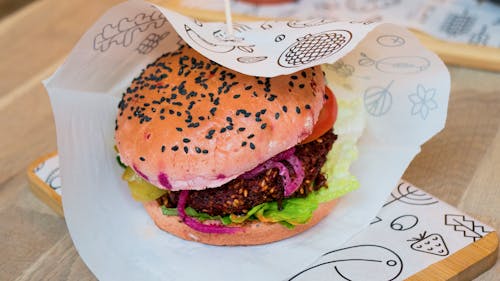
There are many health benefits of following a vegan diet, but is vegan meat healthy? There is a debate about whether or not vegan meat is healthy, but before we get to that, let’s discuss some of the general benefits of being vegan. Not only is a vegan diet richer in certain nutrients than most standard diets, it’s also great for losing weight, ideal for protecting the planet, and is one of the more ethical diets out there. There are many benefits of plant-based eating.
Unfortunately, making the transition from eating meat to avoiding all kinds of animal proteins isn’t always easy. Even if most people feel happier and healthier on the vegan diet, it’s common for some to feel like they’re missing out on their favourite foods. This is where vegan meat comes in.
Designed to mimic the texture, look, and flavour of the real thing, vegan meat can add something “extra” to your vegan meals. Some vegan meat tastes really good. The question is, is vegan meat healthy? Is it just as nutrition-packed as anything else in your vegan diet, or should it be reserved only for special occasions? Let’s find out.
What Exactly is Vegan Meat?
Vegan meat, faux meat, or “fake” meat are vegan products designed to look and taste like meat, without the actual animal content. While the exact contents of your vegan meat might vary, most are made from a mixture of ingredients like textured vegetable protein, wheat gluten, soy, and vegetables.
Keep in mind, vegan meat isn’t the same as “meatless” products. While meatless products can contain plant-based products, like eggs, or casein, vegan meat contains no animal products at all.
In recent years, the popularity of vegan meats has exploded, thanks to the success of solutions such as the “Beyond Burger” vegan burger, which some customers claim is better than the real thing. For vegans, the introduction of countless new meat-free products is an opportunity to expand their diet.
Vegan meat is typically made of ingredients such as:
- Soy beans (the ingredients in tofu and tempeh)
- Wheat, and wheat gluten
- Peas and pea protein
- Oils that make your vegan meat sizzle in the pan
- Starches like corn and potatoes
- Various herbs and spices

Vegan Meat and Sodium: The Salt Problem
As mentioned above, vegan meat products can vary in their ingredients, depending on what you buy. Unfortunately, many of the meat-free items on the menu in your local supermarket may not be as healthy as they appear.
Though often advertised as “plant-based”, the vegan meats on the market today can often be high in other additives, designed to give it a unique “meat-like” flavour. Studies suggest a single piece of meat-free bacon can contain more than a third of a day’s worth of recommended salt.
The Beyond Burger, for example, has around 380mg of sodium, while the Impossible Burger has 370mg, making up around 16% of your total recommended daily limit. On the other hand, a meat-based hamburger from McDonald’s will only contain about 125mg of sodium.
This doesn’t mean all-vegan meat is unhealthy, however. The exact ingredients of vegan meats will have a direct impact on how they influence your health. Additionally, it’s worth noting that even with the extra salt, vegan meat might still be better for you.
Is Vegan Meat Healthier than Regular Meat?
Is vegan meat healthy if you compare it to regular meat? While the salt levels in an Impossible burger might be higher than those in a McDonald’s patty, the calories in vegan meat are lower, around 630 calories compared to 660. This might not seem like a huge difference, it’s also worth noting that many vegan meats can also contain less saturated fat too.
If you look at the vegan meat products in supermarkets, the difference between calorie intakes is much more significant. For instance, the vegan burger in Iceland contains around 190 calories per 100g, compared to 308 calories for the same type of burger, with meat.
Another point worth noting is that while some vegan products are high in calories, salt, and fat, they can still be safer than conventional meat for your overall health.
WHO named red meats a group 2 carcinogen in 2015, meaning they can often be linked to cancer in humans. Processed meat is particularly dangerous, often being linked to issues like pancreatic, prostate, and colorectal cancer. A study from Oxford published more recently also found that eating just three pieces of bacon a day could heighten your chances of bowel cancer by up to 20%.
If the promise of fewer calories and carcinogens wasn’t enough to prompt more people to consider vegan meat, it’s also worth noting that plant products help you to avoid a range of other ailments associated with meat consumption.
The regular consumption of meat is often associated with heart disease, while according to the American Heart Association, eating vegan food is the most effective way to reduce your risk of heart problems. Reducing your consumption of meat can also improve your chances of preventing, managing, or reversing diabetes, according to some studies.
Should You Eat Vegan Meat?
Vegan meat has some drawbacks, but it’s overall pretty healthy. Often, processing plant-based ingredients into a “meat-like” substance can remove essential nutrients, like fibre, vitamins, and minerals you would otherwise get from the non-processed versions. Plant-based meats can often contain a lot more sodium than animal meats, as mentioned above. Some companies even add artificial colouring, sugars, and controversial additives to their fake meat products too.
Combined with the high price tag of vegan meat, the controversy around the product has prompted many people hoping to become more ethical eaters in the other direction. However, it’s important to remember that eating vegan meat is generally still better than eating animal meat.
When you swap animal meat for vegan meat, you:
- Reduce your environmental impact: Any alternative to beef benefits the environment. Studies show that eating meat, especially red meat, has a direct impact on the planet.
- Protect animal welfare: If you want to look after the animals, and protect them from being farmed for food, eating vegan meat is a great way to do that.
- Ease the transition to veganism: Some people find it’s much easier to make the transition to veganism with vegan meat. One poll study found 68% of respondents said they’d swap real meat for a plant-based alternative if it tasted the same.
- Could be better for your health: As mentioned above, vegan meat is generally always better than regular meat, in every way other than salt contents. One small study published recently found that people who swapped two or more servings of animal meat per day for plant-based meat had lower LDL cholesterol, and better fibre intake.

Tips for Trying Vegan Meat
It’s worth checking for any food intolerances or food sensitivities you might have before trying vegan meat. Blood tests or a DNA test will help you find out which ingredients you may want to avoid.
Once you know where you stand, you can begin taking a magnifying glass to the ingredients on your vegan meat products. Ask yourself:
- What are the protein sources? Avoid products made with soy protein isolate and wheat gluten and look for options made with pea protein and beans instead.
- Are there simple ingredients? Lots of hard-to-pronounce ingredients like leghemoglobin generally indicate a less healthy meat. Look for simple, recognisable foods.
- How much protein does it have? The more protein you can get out of your plant-based meats, the better. Ideally, you’ll want about 20mg of protein per meal.
- What is the fat and sodium content? While many meat-free products are free from cholesterol, they can be higher in saturated fats and sodium. Look at the levels of sodium and fat in a meat-based item compared to your non-meat alternative.
If you struggle to find a vegan meat product you feel comfortable with, you can always consider a traditional alternative instead. Tofu is made from the whole soybean, rather than an isolate, so it’s better for you than some processed plant-based products. Tempeh is an alternative if you don’t like the slightly softer texture of tofu. You could also look into making your own veggie burgers at home.
Is Vegan Meat Healthy? The Bottom Line
Although vegan meat has some drawbacks such as high sodium, it’s still generally healthier than animal meat. If you’ve been considering making the switch to veganism, but you’re not comfortable giving up on meat entirely yet, vegan meat products could help you transition. Just make sure you do your research before you jump in and start filling your freezer with vegan meat.
